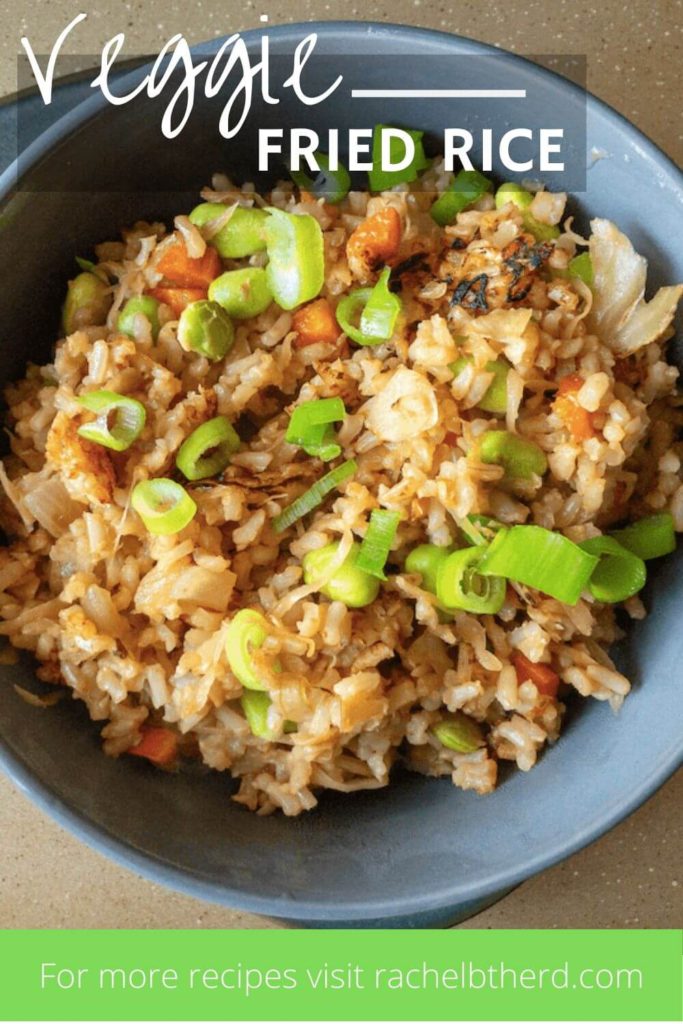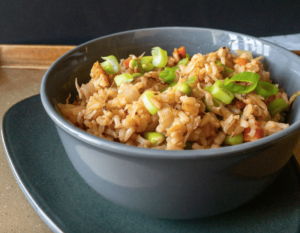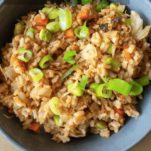This Asian fried rice recipe is a lower-calorie version of your favorite take-out with an extra dose of veggies to make it a healthy meal. It is great on its own or as a side!
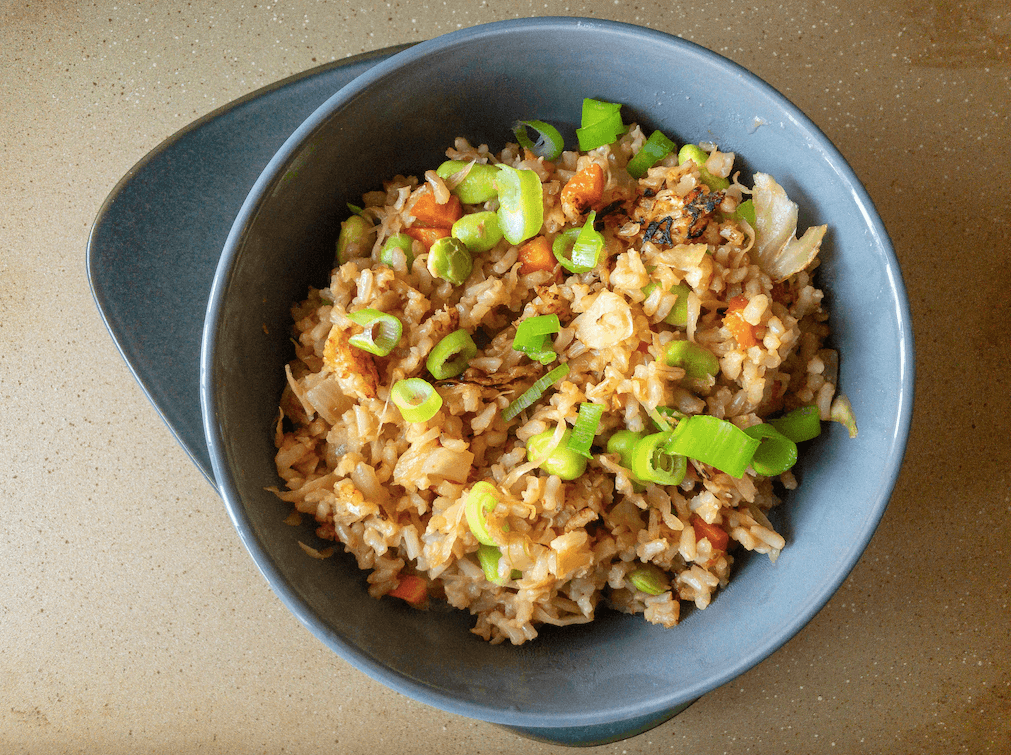
Forget ordering takeout when you can make this fried rice dish at home that tastes just as good as the original. I know Asian cuisine may seem intimidating, but I promise this fried rice is simple to make. This recipe can be made with ingredients that are available at your local supermarket, and you probably already have most of them in your kitchen.
Healthy food shouldn’t be bland!
When people start to eat healthier, one of the things I hear most often is that they are worried that their food will be boring and bland. They don’t want to eat chicken breast and steamed veggies every night. Honestly, I don’t blame them. I couldn’t eat like that, nor would I recommend it. Food should be full of flavor so you enjoy it and feel satisfied.
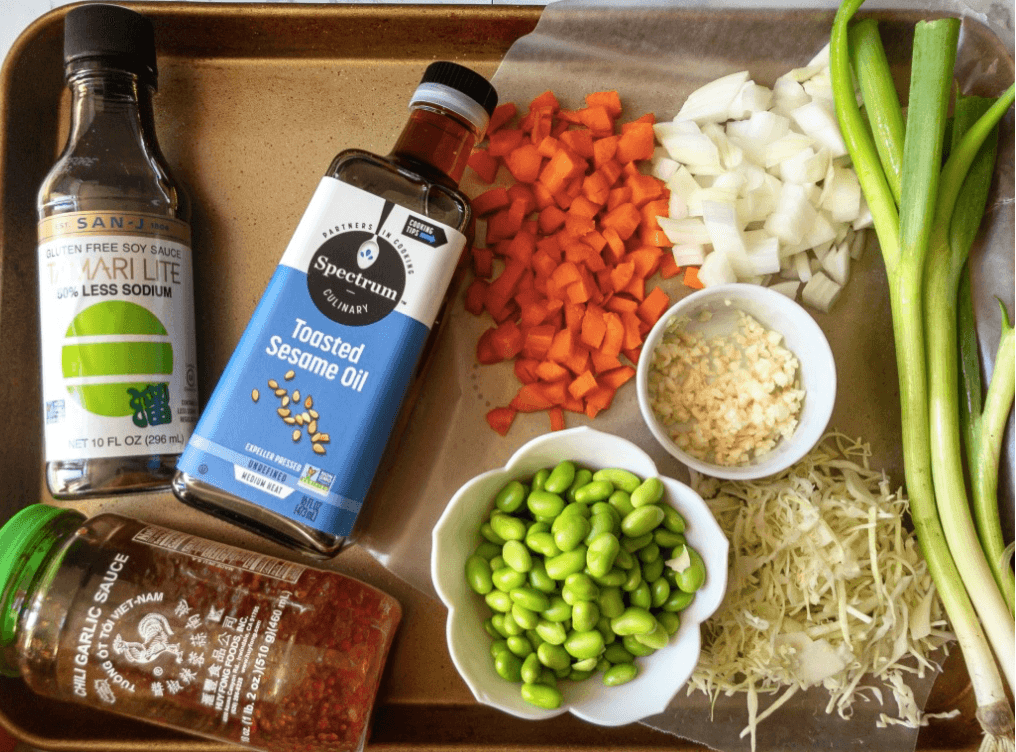
My goal is to show you that you can enjoy healthier versions of your favorite foods. Asian food is one of my favorite comfort foods to put a healthy spin on.
Asian cuisine gets a bad rap for having overly sugary/sweet or extremely salty sauces and fried food options. But there is something comforting about Asian takeout. While there is room in an overall healthy balanced diet to indulge, you can easily hack your favorite Asian dishes at home, like this fried rice, and make it more nutritious.
Using quality ingredients you can make these meals with less fat, sodium, and calories. Bump up the nutritional content further by adding a lot of vegetables and lean proteins.
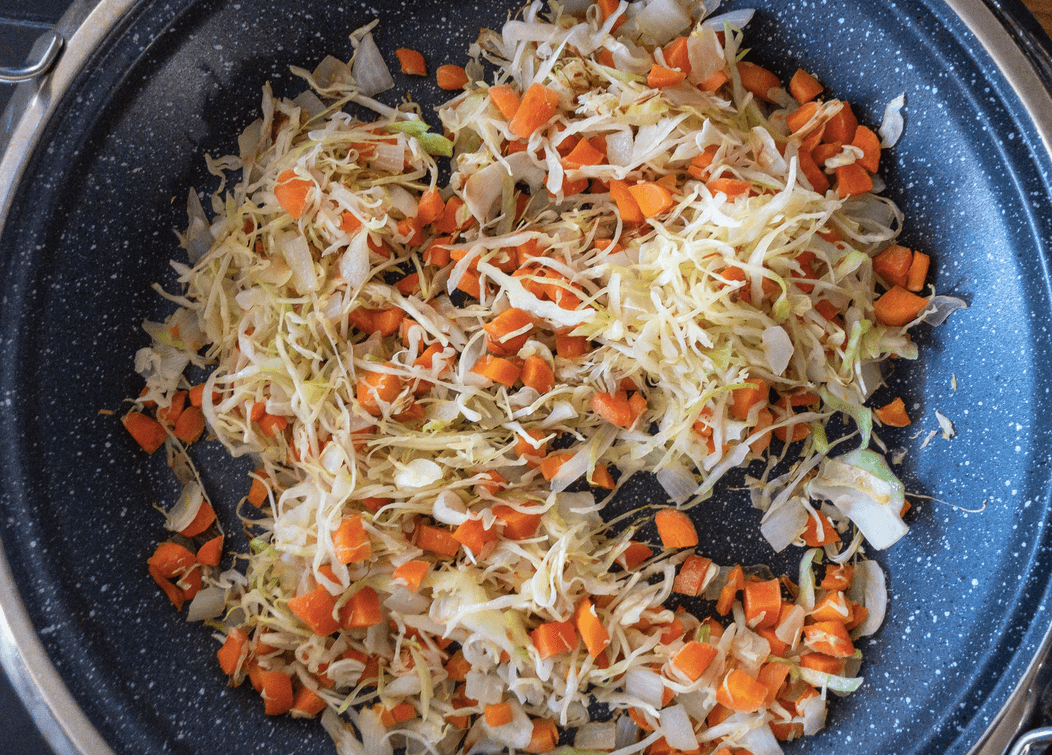
Why is This Recipe Healthier?
When making a dish like fried rice healthy, similar to pasta dishes, the same strategy should be used: bulk up the dish with lots of vegetables and add some protein. Vegetables contain fiber which make you feel full, and protein is digested slower to help you stay full longer and feel satisfied.
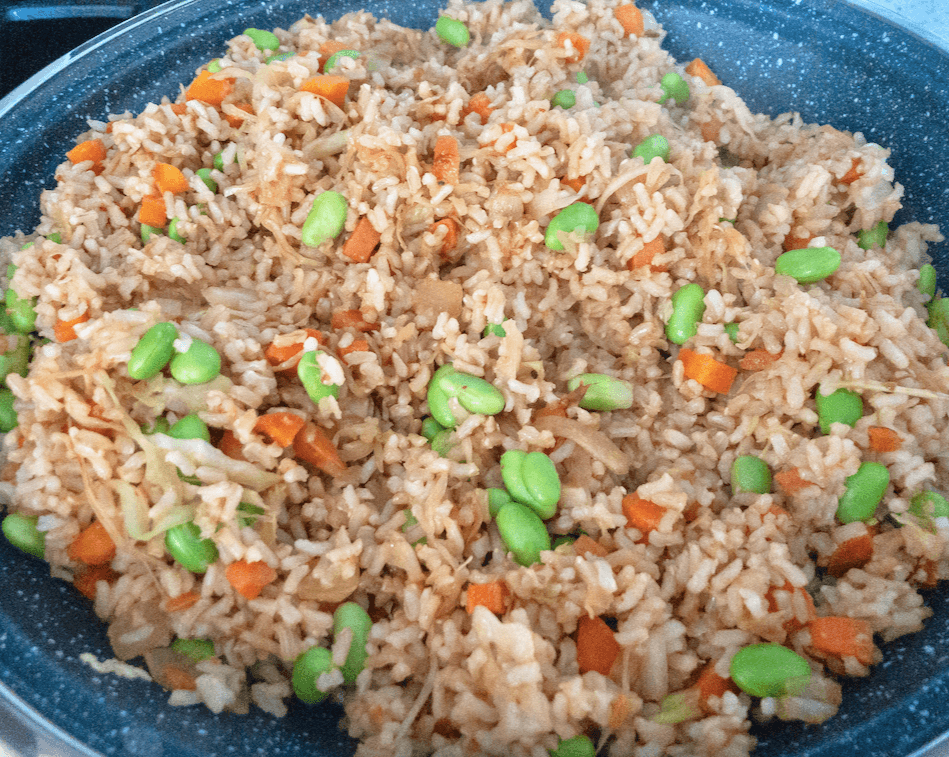
When you portion out the rice you won’t feel deprived because the portion will appear larger due to all the added vegetables in the dish. This method of eating is called ‘volume eating,’ which is not a new concept.
What is Volume Eating?
Have you ever measured out the serving size recommended on the box of cereal or served yourself an appropriate portion of cooked pasta (~1/3 cup) and looked down at a half empty bowl thinking, this is all I get? Not surprisingly, most people serve themselves probably 3 times the amount believing that it is one serving. When you are trying to lose weight, or maintain, having small portions can feel restricting. This inevitably leads to cravings and binging on food.
If you eat foods that have a lot of volume, but are low in calories, you will fill your stomach and feel more satisfied on fewer calories. Vegetables are high volume, due to the water content and fiber, with few calories. Plus they incorporate additional vitamins, minerals, and phytonutrients into your diet.
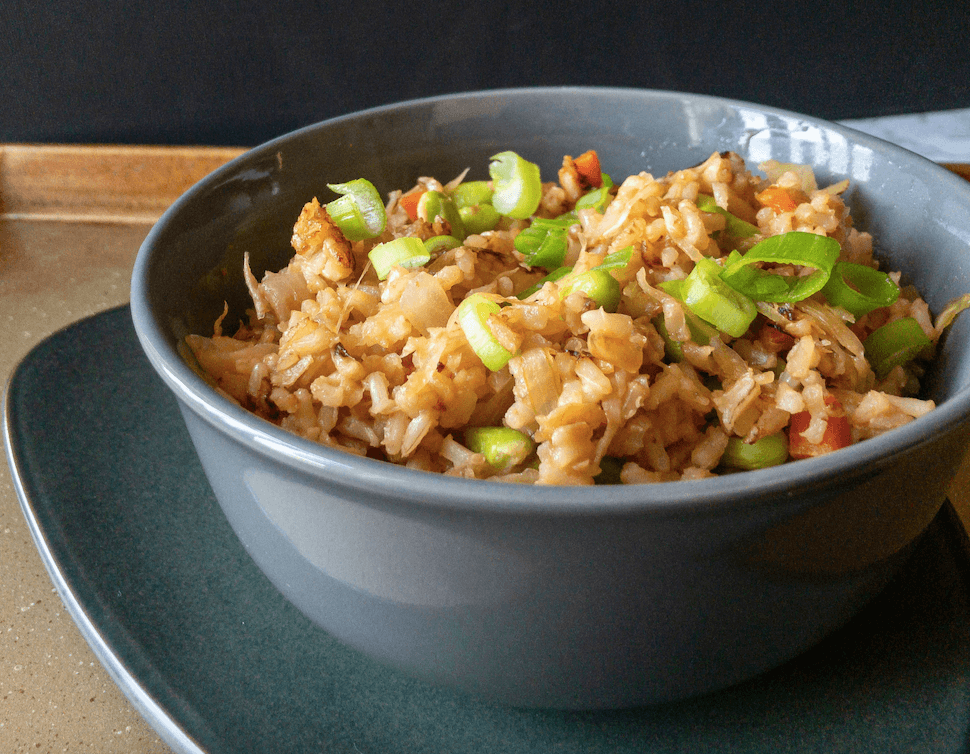
If you take that serving of pasta and add 1 cup of vegetables and a portion of protein it will bulk up the dish. Visually the bowl will look full, and you will feel like you are having a generous portion. In addition, you will feel more full and satisfied with less.
This volume trick can also be used when you have takeout. Just add in steamed or grilled vegetables to whatever dish you order. My largest problem with a lot of Asian takeout is that the starchy dishes (noodles, rice) are usually 80% starch, 20% vegetables (or less). Not this homemade fried rice!
Other Recipe Ideas or Tips:
- Top the rice with your favorite cooked protein like chicken, beef, pork, shrimp, salmon or tofu
- Leave out the eggs for a completely plant based dish
- Substitute the brown rice for jasmine rice, quinoa or riced cauliflower for a low carbohydrate meal option
- Make it gluten free by swapping out soy sauce with tamari or coconut aminos. Soy sauce contains gluten so be sure to read the label. Also, choose the reduced or low sodium versions to cut back on salt.
- Make it spicy- add additional chili sauce, sriracha, jalapeño or any other Asian spices
- Substitute or toss in your favorite vegetables: peas, sugar snap peas, green beans, baby corn, broccoli, bok choy, bean sprouts, zucchini, bell peppers and more.
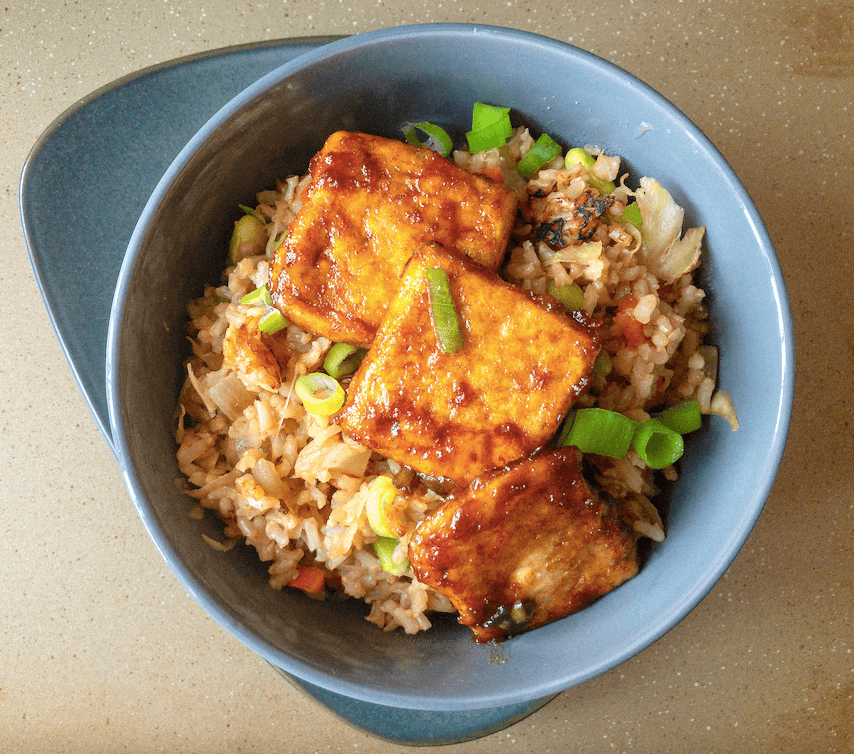
Fried Rice (Better Than Takeout!)
Ingredients
- 1 ½ teaspoons extra light olive oil
- 10 baby carrots or 2 large, diced small
- ½ medium yellow onion diced
- ¼ small to medium cabbage shredded or 1-2 cups bag shredded cabbage
- 3-4 cloves of garlic minced
- ⅓ cup edamame or peas shelled
- ½ bunch scallions sliced thin
- 1 bag instant brown rice or 1 cup raw rice or quinoa
- 1 egg optional, beaten
Sauce
- 2 Tablespoons reduced sodium soy sauce or tamari
- 1 ½ teaspoons sesame oil
- 1 teaspoon rice vinegar
- 1 teaspoon chili sauce
- 1 Tablespoon fresh ginger grated
Instructions
- Heat the olive oil in a large non-stick pan or wok over medium-high heat. Sauté carrots and onions, ~10-12 mins or until vegetables are tender.
- As the onions and carrots are cooking, prepare the brown rice or quinoa according to the package directions. When the grain is finished cooking , remove from heat and set aside.
- Add the shredded cabbage to the pan with the carrots and onions. Sauté for another 3-5 minutes until cabbage has softened. Add garlic, cook for 1 minute, until fragrant.
- Note: if adding the egg, push the vegetables to the side and pour the beaten egg into the pan. Once cooked, mix the eggs with the vegetables.
- Mix the ingredients for the sauce in a small bowl and set aside.
- Add rice or quinoa to the pan and mix it all together. (you can turn the heat up higher and let the grain get caramelized if you like to have it crispy).
- Add the sauce and edamame to the pan and stir until well combined and fragrant. Taste the rice and add more soy sauce, ginger or chili sauce to your liking. But, don't overdo the soy sauce, you don't want to overpower the other flavors.
- Take the fried rice off the heat and add the sliced scallions. Serve immediately and enjoy!
Nutrition Facts
This fried rice recipe is so much tastier and healthier than takeout!
Need more recipe inspiration using pantry staples? Check out some of my other recipes below
Greek Orzo Pasta Salad (substitute regular pasta if you don’t have orzo; can use jarred or frozen vegetables)
Hungry for more? Subscribe to get my latest recipes delivered straight to your inbox!
Save This Recipe For Later!
